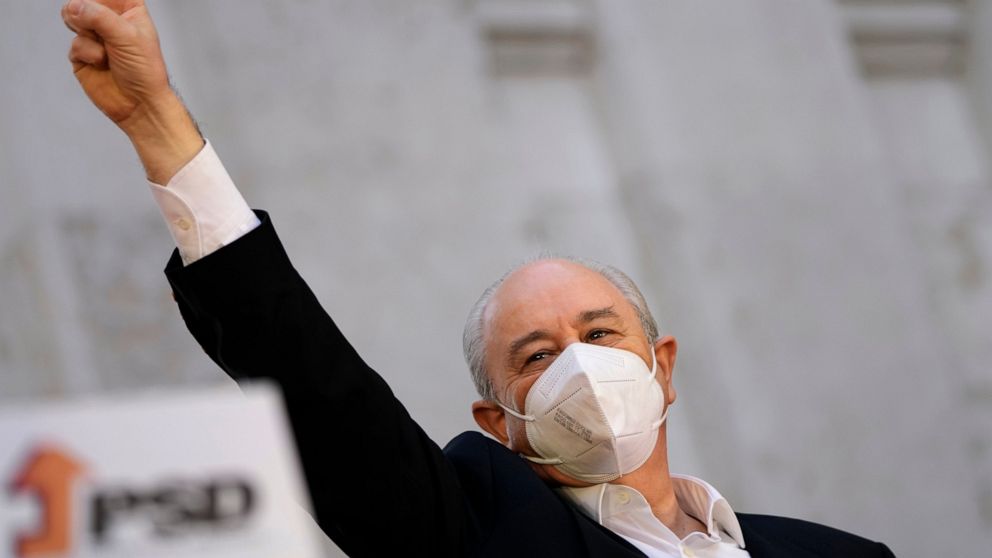Exit poll suggests Socialists win reelection in Portugal
LISBON, Portugal — An exit poll in Portugal’s general election suggested the center-left Socialist Party was reelected Sunday, beating its main rival, the center-right Social Democratic Party, in a ballot that took place amid a surge of COVID-19 cases blamed on the omicron variant.
The poll by Portugal’s Catholic University for public broadcaster RTP estimated that the Socialists collected between 37% to 42% of the vote on Sunday, with the Social Democrats taking between 30% to 35%.
That result could potentially grant the Socialists as many as 116 seats in the 230-seat parliament, allowing it an overall majority to push through its legislation without forming alliances with smaller parties.
The poll did not take into account the approximately 1.5 million people, out of an electorate of 10.8 million eligible voters, who live abroad and can vote by mail.
The Socialist Party, which has governed for the past six years, and the Social Democratic Party are Portugal’s two main parties. They have alternated in power for decades.
Chega! (Enough!), a populist and nationalist party founded less than three years ago, appeared to have collected 5% to 8% of the vote, the poll estimated. That might give it as many as 13 lawmakers, up from only one in the last parliament.
The poll indicated the Left Bloc may have captured 3% to 6% of the vote, with 3% to 5% for the Portuguese Communist Party.
Turnout was between 46% to 51%, according to the exit poll. At the last election in 2019, the turnout was 48.6%.
About 1 million people over 18 were in home confinement Sunday due to COVID-19 infections, health authorities said. They were exceptionally allowed out to cast their ballots.
The stakes are high: Portugal, a country of 10.3 million people, is poised to begin deploying 45 billion euros ($50 billion) of aid as a member of the EU to help spur the economy after the COVID-19 pandemic.
Two-thirds of that sum is intended for public projects, such as major infrastructure, giving the next government a financial bonanza. The other third is to be awarded to private companies.
President Marcelo Rebelo de Sousa, in an election-eve address to the nation, urged people to vote, declaring it’s “a way of saying that … nothing, and nobody, can silence our voice.”
He said the coming years would be marked by “leaving behind a painful pandemic (and) an urgent rebuilding of the economy.”
Miguel Morgado, a 49-year-old company manager voting in Lisbon, the capital, said he wasn’t worried by the high virus infection rate and hoped the country would soon be back to normal.
“Above all, it is our civic duty to vote, the country needs it,” he said.
Since it came to power in 2015, the Socialist Party had relied on the support of their smaller allies in parliament — the Left Bloc and the Portuguese Communist Party — to ensure the annual state budget had enough votes to pass. But last November their differences, especially over public health spending and workers’ rights, were insurmountable, leaving Socialist Prime Minister António Costa short of votes to pass his party’s plan.
Costa could seek to resurrect the left-of-center alliance, despite some acrimonious exchanges during the election campaign.
The Socialist Party promised to increase the minimum monthly wage, earned by more than 800,000 people, to 900 euros ($1,020) by 2026. It is currently 705 euros ($800). Low wages are a common grievance among voters. The Socialists also want to “start a national conversation” about working four days a week instead of five.
The Social Democratic Party is promising income tax cuts and more help for private companies, cutting corporate tax from the current 21% to 17% by 2024.
The winner will also have more deep-rooted problems to address, including an economy that can’t get traction.
Portugal’s economy has been falling behind the rest of the 27-nation EU since 2000, when its real annual gross domestic product per capita was 16,230 euros ($18,300) compared with an EU average of 22,460 ($25,330).
By 2020, Portugal had edged higher to 17,070 euros ($19,250) while the bloc’s average surged to 26,380 euros ($29,750).
———
Helena Alves contributed to this report.
![]()


